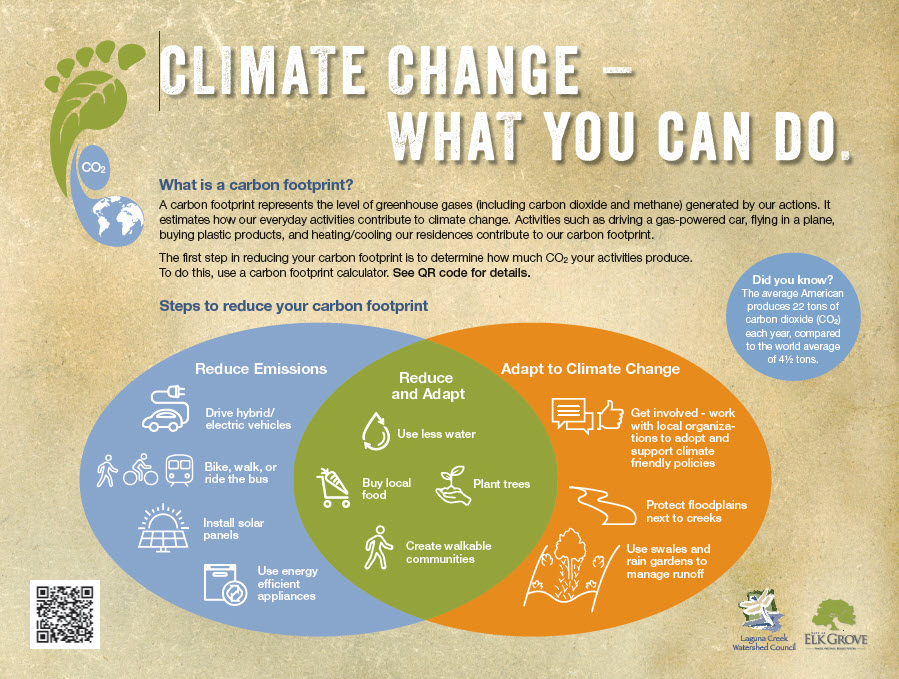CLIMATE CHANGE – WHAT YOU CAN DO

Climate change is affecting us all. To foster a greater understanding of the nature of climate change and provide practical steps watershed residents can take to do their part to address the climate crisis, links are provide below with a brief summary of the information on each website.
This information is intended to supplement the interpretive signs installed along local creek trails. Please check back regularly as new material will be posted on a regular basis.
Carbon Footprint Calculator:
- Easy to use, everything explained when asking the questions. At the end it shows how many trees there need to be planted in order to counter your carbon emissions, you can also see the US average and compare: https://www.conservation.org/carbon-footprint-calculator#/
Gardens and Tree Planting:
Trees provide many benefits in the urban, suburban and rural landscape including reducing air pollution, and reducing temperatures by as much as 10 degrees by providing shade, and sequestering carbon.
- Urban trees can save lives
https://www.nature.org/en-us/what-we-do/our-insights/perspectives/how-urban-trees-can-save-lives/=
- Using Trees and Vegetation to Reduce Heat Islands
https://www.epa.gov/heatislands/using-trees-and-vegetation-reduce-heat-islands
- Sacramento Shade is a program of the Sacramento Tree Foundation offered to SMUD customers in Sacramento County which provides a free landscape assessment and free shade trees.
https://www.sactree.com/shadetrees
- Provides information about choosing trees appropriate for the site, how to plant and maintain trees, and how to become involved in community tree planting projects.
- Talks about the importance of oak trees in the ecosystem; native oak trees thrive in rural areas, parks, and open space. They provide excellent shade and absorb carbon out of the atmosphere.
https://www.nytimes.com/2021/03/31/realestate/oak-trees-why-you-should-plant.html?smid=url-share
- Discusses the benefits of oak trees, specific to California and the dangers that they face as well as information about the different types of oak trees and their habitats.
- Gives valuable tips in maintaining a garden to help reduce climate change: https://www.nwf.org/Our-Work/Environmental-Threats/Climate-Change/Greenhouse-Gases/Gardening-for-Climate-Change
- Help out local gardens, including the one in Elk Grove! https://elkgrovecommunitygarden.org/
Citizen Science
- Citizen Science opportunities – opportunities for citizens to be involved in climate change research through gathering and sharing data and information. The following article explores the role Citizen Science can play in exploring climate change
Following are two links to Citizen Science programs that may be of interest:
- Inaturalist is a collaborative project between the California Academy of Sciences and National Geographic
- eBird is one of the world’s largest biodiversity-related science programs, with more than 100 million bird sightings contributed annually by citizen scientists.
Work with Groups and the Government to Combat Climate Change
- The Audubon Climate Action Guide presents strategies for citizens to make a difference through climate action at the individual, community and national level: https://www.audubon.org/climate-action-guide
Join local environmental organizations, help by donating or volunteering your time!
- 350 Sacramento is a local grassroots organization committed to equitable solutions that accelerate the transition to a sustainable future, with atmospheric carbon dioxide levels below 350 ppm:
- The Sunrise Movement is an organization of young people united to make climate change an urgent priority across America: https://www.sunrisemovement.org/?ms=SunriseMovement-WeAreTheClimateRevolution
- TUGI’s mission is to inspire and empower youth to achieve urban sustainability through a gardening-based educational program. In order to achieve these goals, we have designed a year-long program that engages youth in environmental education as well as urban gardening in both the fall and the springtime:
https://www.theurbangardeninitiative.org
- Elk Grove Anti Trash Cleanups group’s purpose is to coordinate volunteer community groups by picking up trash and making a cleaner community which is supported and encouraged by the City of Elk Grove, CSD and Republic Services:
https://www.facebook.com/EGAntiTrashCleanups/
Solutions at Home:
- Common sense steps homeowners can take to reduce greenhouse gas emissions. https://www.nrdc.org/stories/how-you-can-stop-global-warming
- Practical suggestions from UC Davis on what individuals can do to contribute to climate change solutions: https://climatechange.ucdavis.edu/what-can-i-do/18-simple-things-you-can-do-about-climate-change/
- Suggestions for reducing waste https://www.nrdc.org/stories/reduce-reuse-recycle-most-all-reduce
- Make eco bricks, by collecting dry and clean plastic and compressing it into plastic bottles. Everyone can make one to limit the effects of plastic pollution to be more specific! Here’s how to make one:
https://www.ecobricks.org/how/
- Upcycle old containers to reduce plastic waste! https://www.treehugger.com/creative-ways-upcycle-your-plastic-bottles-4864134
- Some more ideas for reusing and upcycling bottles: https://www.budgetdumpster.com/blog/diy-plastic-bottles-recycling/
- Provides list of recyclable items and ideas for upcycling and reusing common household items: https://www.reusethisbag.com/articles/creative-recycling-projects
- Learn how to recycle paper yourself at home! https://www.youtube.com/watch?v=RR_218EtLJU
https://www.eekwi.org/activities/arts-crafts/make-your-own-paper
https://docs.google.com/drawings/d/1CwHqzCCM_tUlrqh9L5zmWeFHBifSVEDMYEI4ISGBtWg/edit?usp=sharing
- Information on which items are recyclable
For Sacramento:
http://www.cityofsacramento.org/public-works/rsw/waste-wizard
For Elk Grove: https://www.elkgrovecity.org/city_hall/departments_divisions/garbage_recycling
Citizen Science Opportunities
Ways citizens can be involved in climate change research through gathering and sharing data and information.
- Inaturalist is a collaborative project between the California Academy of Sciences and National Geographic
- eBird is one of the world’s largest biodiversity-related science programs, with more than 100 million bird sightings contributed annually by citizen scientists.
Common sense steps homeowners can take to reduce greenhouse gas emissions.
https://www.nrdc.org/stories/how-you-can-stop-global-warming
Practical suggestions from UC Davis on what individuals can do to contribute to climate change solution.
https://climatechange.ucdavis.edu/what-can-i-do/18-simple-things-you-can-do-about-climate-change/
Excerpts from Bill Gates’ 2021 book “How to Avoid a Climate Disaster”. It includes suggestions for both individual practices as well as community actions to reduce greenhouse gas emissions. Includes a short video.
https://www.gatesnotes.com/Energy/What-you-can-do-to-fight-climate-change
City of Elk Grove Climate Action Plan – includes an explanation of what a CAP is:
https://www.elkgrovecity.org/city_hall/departments_divisions/planning/city_special_projects/climate_action_plan
©Copyright 2021 Laguna Creek Watershed Council. All rights reserved.
Contact Laguna Creek Watershed Council
Wilton, CA 95693
